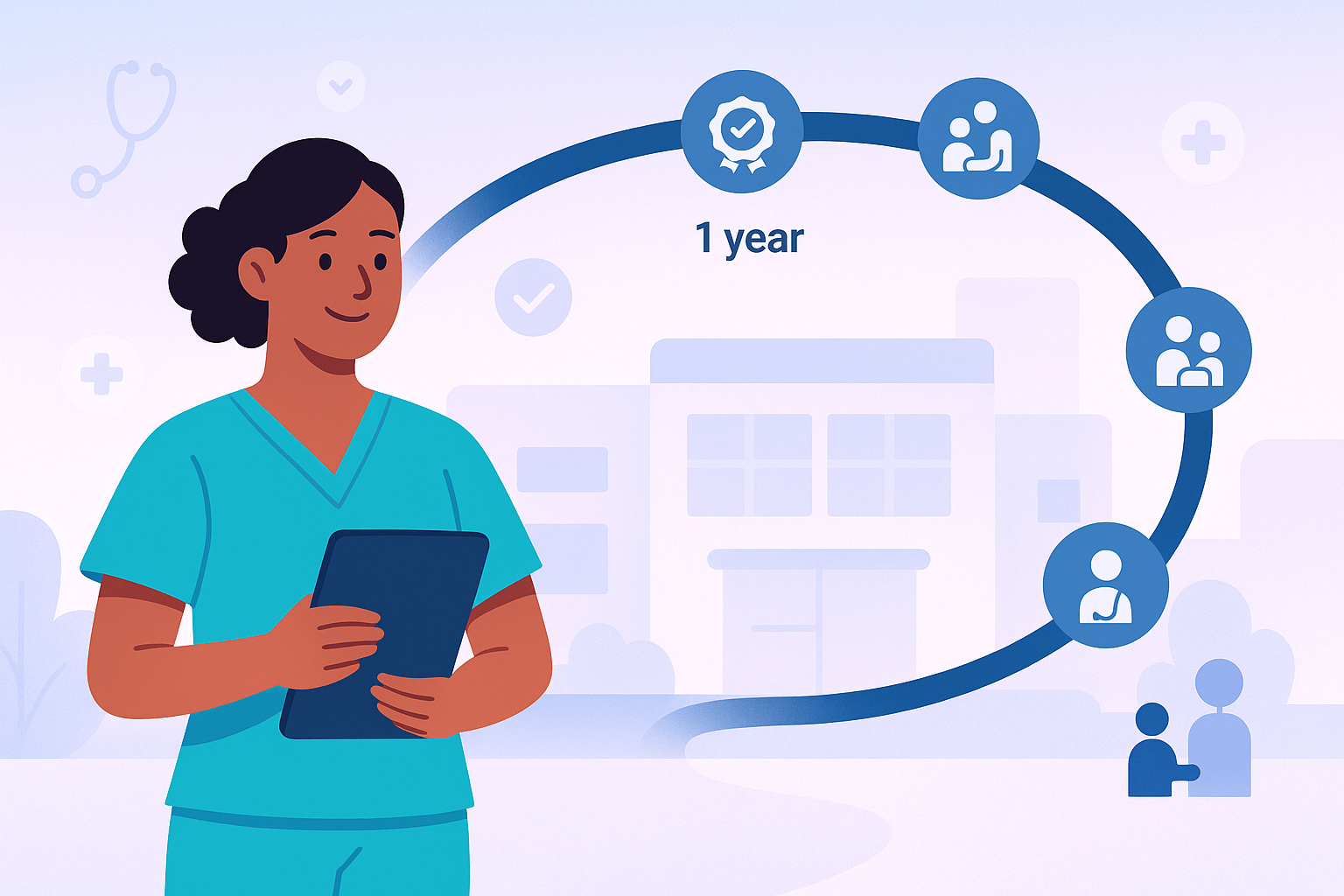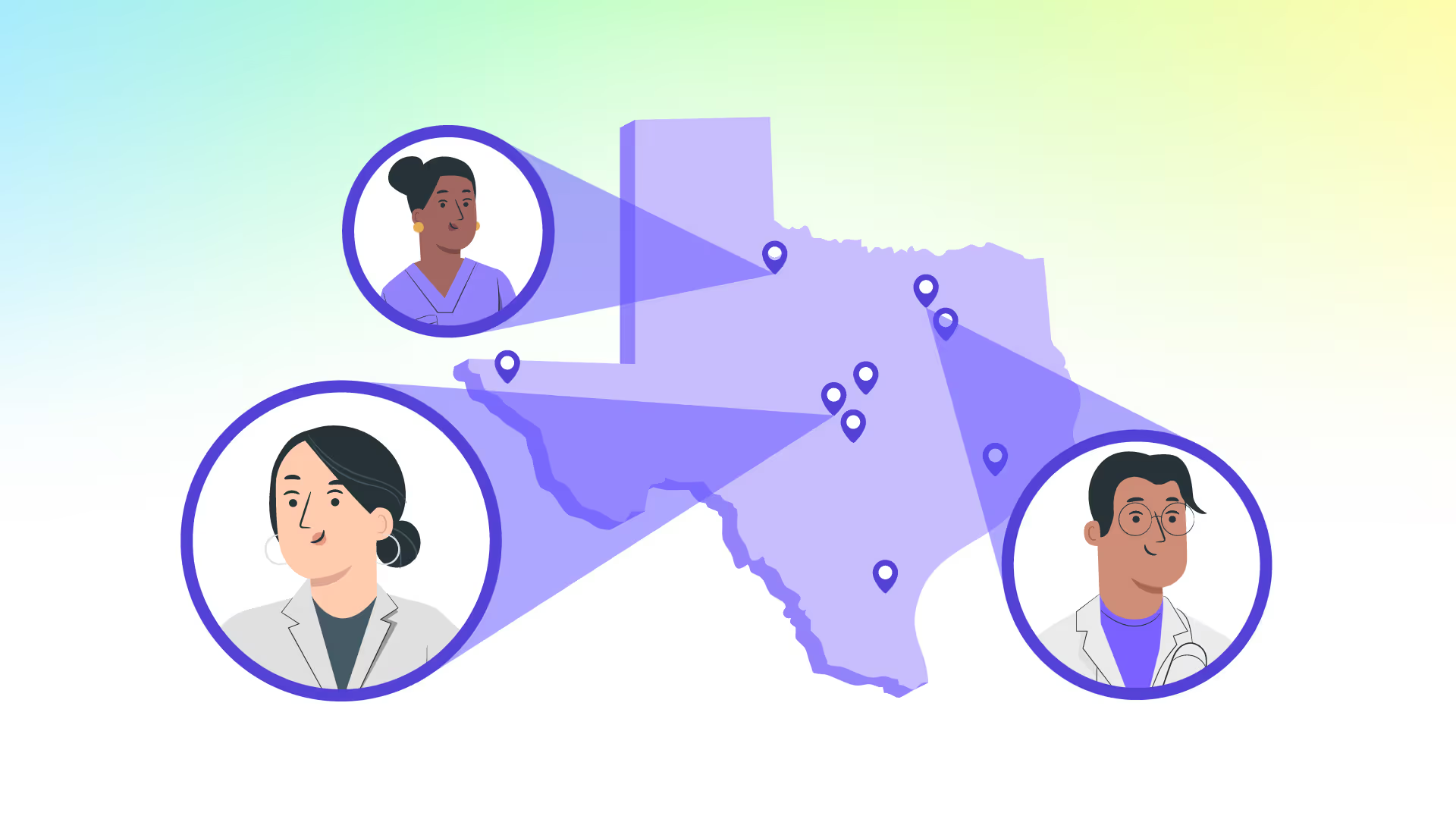TL;DR: How Long Do You Have to Be a Nurse Practitioner to Be a Preceptor?
- One year is the standard minimum. Most NP programs require at least one year of clinical experience post-certification to become a clinical preceptor, though some may ask for two years depending on specialty and state requirements.
- Active licensure and board certification are essential. Beyond experience, you need current state licensure and board certification through ANCC or another recognized certifying body, plus alignment between your population focus and the student's program objectives.
- Clinical expertise doesn't equal teaching readiness. Being a qualified preceptor requires more than clinical competence, you need the ability to provide constructive feedback, time for supervision, and a practice setting that supports student learning.
- The benefits extend beyond giving back. Precepting sharpens your clinical knowledge, builds leadership skills, offers continuing education credits, expands your professional network, and can provide financial compensation through platforms like NPHub.
- Getting started is easier with support. Whether you connect with local NP programs independently or join a preceptor network like NPHub that handles paperwork and student matching, the key is understanding your readiness and accessing the right resources to make your first clinical rotation successful.
Whether you're exploring how to become an NP preceptor or searching for one as a student, understanding these qualifications matters.
It's a question that comes up more often than you'd think: "How much clinical experience do I really need before I can precept?"
Maybe you're a nurse practitioner who's been approached about precepting, wondering if you're truly ready to guide an APRN student through their clinical rotation. Or perhaps you're on the other side, searching for a preceptor and trying to figure out what preceptor qualifications actually matter. What separates someone who's merely qualified on paper from a mentor who can genuinely support your educational journey?
Either way, the answer isn't always clear-cut.
Experienced nurse practitioners often underestimate their readiness to precept. They hold themselves to impossibly high standards, waiting years longer than necessary to share their clinical expertise with nursing students who desperately need guidance.
Meanwhile, NP students are struggling to find qualified clinical preceptors. With limited support from faculty, unclear information about specific preceptor qualifications, and clinical placement deadlines looming, the search becomes overwhelming. Many students spend months reaching out to potential preceptors, all while juggling coursework at the master's level and working full-time, only to face rejection after rejection. Or worse, they discover their chosen preceptor doesn't meet their program requirements after they've already invested weeks building that connection.
This disconnect fuels the nationwide preceptor shortage. The result? Delayed graduations, mounting stress, and a new generation of nursing students missing out on the mentorship that shaped the nurse practitioners who came before them.
For practicing NPs ready to make an impact: If the idea of juggling paperwork, coordinating with universities, and vetting students feels overwhelming, joining NPHub's preceptor network means you get matched with quality students while we handle the logistics and support you from start to finish.
For NP students exhausted from searching: Stop spending months reaching out to preceptors who may not meet your program's requirements. When you create your free NPHub account, you gain immediate access to our network of rigorously vetted clinical preceptors who match your population focus and are committed to student learning, so you can focus on your clinical experience instead of endless emails.
.png)
Let's dive into exactly how long you need to practice before becoming a preceptor, and whether you're ready to take that step.
How to Become an NP Preceptor: Minimum Requirements
If you're looking for a straightforward answer, here it is: most NP programs and universities require at least one year of clinical experience after you've obtained your nurse practitioner certification. Some programs may ask for two years, but one year is the most common baseline you'll encounter.
That might sound surprisingly short, and for many experienced NPs, it feels almost too short. But there's solid reasoning behind this timeline, which we'll explore in a moment.
The Essential Qualifications Checklist
Beyond the one-year experience requirement, here's what you need to become a clinical preceptor:
- Active licensure and certification: You must hold a current NP license in the state where you plan to precept, along with board certification through the American Nurses Credentialing Center(ANCC) or another recognized certifying body. This demonstrates you've met national standards for clinical competence in your specialty.
- Clinical practice in your population focus: Your experience must align with the student's needs. If you're a family nurse practitioner, you can mentor FNP students. If you practice in adult gerontology primary care, that's your wheelhouse. The match between your population-focused area and the student's program objectives is essential for effective teaching.
- Current clinical practice: You need to be actively practicing, not just maintaining your certification, but actually seeing patients and making clinical decisions regularly. Students need to observe real-world clinical expertise in action.
Why These Requirements Exist
Patient safety comes first. Students are still developing their clinical judgment, and they need a preceptor with enough experience to catch potential errors and guide decision-making in real time. After at least one year of clinical experience, most nurse practitioners have encountered enough clinical scenarios to provide appropriate supervision.
Quality mentorship requires confidence in your own clinical practice. By the time you've completed a year of independent practice, you've likely developed reliable patterns, managed common complications, and built the clinical knowledge necessary to explain the "why" behind your decisions, not just the "what."
Clinical expertise deepens with experience. While you don't need decades of practice to be effective, you do need enough time to have moved beyond survival mode and into a place where you can simultaneously manage patient care and support student learning.
The good news? If you've been practicing for a year and feel hesitant, remember that the process of becoming a preceptor involves support systems, whether through university partnerships or platforms designed to guide you through your first rotations. Many NPs find that working with students actually reinforces their own clinical reasoning and keeps their clinical knowledge fresh.
For students wondering if a potential preceptor meets these standards, understanding these baseline requirements helps you ask the right questions during your search. If you'd rather skip the vetting process entirely and connect with preceptors who've already been verified against these criteria, creating a free NPHub account gives you immediate access to our network of qualified clinical preceptors who match your specialty and population focus, so you can move forward with your clinical placement confidently.
Beyond the Minimum: What Makes a Qualified Preceptor
Meeting the one-year experience requirement is just the starting line. The real question isn't whether you're eligible to precept, it's whether you're ready to create a transformative learning experience for an APRN student.
Here's the truth: clinical expertise and teaching ability are not the same thing. You can be exceptional at patient care and still wonder how to translate that skill into effective mentorship. The good news? The qualities that make someone a great preceptor can be developed with intention and the right support.
Clinical Competence Is Essential, But It's Not Everything
Every qualified preceptor needs solid clinical practice in their specialty. You should feel confident managing your cases, comfortable explaining your clinical decision-making, and current with evidence-based guidelines in your population focus.
But being a strong clinician doesn't automatically make you an effective teacher. What separates a qualified preceptor from an exceptional one is the ability to maintain quality patient care while simultaneously creating space for student learning.
The Profile of an Effective Clinical Preceptor
Based on feedback from NP students, program directors, and experienced preceptors, here are the qualities that matter most:
A passion for teaching and mentorship: The best clinical preceptors genuinely enjoy watching students grow. They remember their own educational journey, and they're motivated to be the kind of mentor they once needed. This isn't about formal teaching credentials, it's about approaching each clinical rotation with genuine investment in student progress.
The ability to provide constructive feedback: Students need more than "good job" or silence. Effective preceptors know how to give feedback that's specific, timely, and actionable, helping students refine their clinical skills and build the self-awareness they'll need throughout their careers.
Understanding of program objectives and requirements: You should understand what competencies your student needs to demonstrate and how their clinical faculty will evaluate performance. This alignment ensures the clinical hours actually contribute to their educational goals.
Time and bandwidth to provide supervision: Precepting requires mental and emotional bandwidth. If you're drowning in your patient load or working in an environment that doesn't support teaching, it's not the right time. Quality supervision means being present, available for questions, and attentive to patient safety.
Does Your Practice Setting Support Student Learning?
Even if you personally check all the boxes, your clinical site matters too:
- Patient volume and variety: Does your clinical facility see enough patients with diverse conditions to provide meaningful exposure?
- Institutional support: Does your employer support having students, or will you be navigating resistance?
- Physical space and resources: Can your student observe and participate without crowding your workflow?
Assessing Your Readiness
Still wondering if you're ready? Ask yourself:
- Can I articulate why I make clinical decisions, not just what I do?
- Do I have the patience to let a student take longer on tasks I could complete quickly?
- Am I comfortable admitting when I don't know something and modeling how to find answers?
- Am I current with my own continuing education and clinical best practices?
If you answered yes to most of these, you're likely more prepared than you think. Remember that becoming a preceptor is a learning process too, one that gets easier with experience and proper support.
For practicing NPs who want to step into this role with confidence, joining a preceptor network like NPHub means you'll have guidance as you navigate your first rotations and access to resources that help you develop your teaching skills.
The Benefits of Becoming an NP Preceptor
If you're still on the fence about precepting, consider what you stand to gain, professionally, personally, and yes, even financially.
Impact on the Nursing Profession
By becoming a clinical preceptor, you directly shape future healthcare providers and address the critical preceptor shortage affecting NP students nationwide. You're giving back to the nursing profession that invested in you, while staying current with evidence-based practice through the fresh perspectives students bring.
Professional Growth
Precepting sharpens your own clinical knowledge and critical thinking. Every time you explain your reasoning to a student, you reinforce your expertise. You'll build leadership skills that position you for administrative or faculty roles, expand your professional network with clinical faculty and academic institutions, and, in many cases, earn continuing education credits toward certification renewal.
Personal Fulfillment
There's deep satisfaction in watching student progress, seeing someone move from hesitant observer to confident clinician. Many preceptors describe it as one of the most meaningful contributions to their educational journey. You become the role model you once needed.
Financial Compensation
While many preceptors volunteer their time, platforms like NPHub compensate preceptors for their teaching work, recognizing that your expertise and time have real value. It's an opportunity to earn additional income while nurturing the next generation of nurse practitioners.
How to Get Started as an NP Preceptor
Ready to take the leap? Here's your step-by-step roadmap to becoming a clinical preceptor:
1. Verify you meet the requirements: Confirm you have at least one year of clinical experience post-certification, active state licensure, and board certification through ANCC or another recognized certifying body.
2. Get institutional buy-in: Talk with your clinical site manager or employer about hosting NP students. Clarify any policies, liability coverage, and whether your clinical facility supports student learning.
3. Connect with nursing programs: Reach out to local NP programs and their program directors. Many universities maintain preceptor databases and can walk you through their specific preceptor qualifications and expectations.
4. Understand the commitment: Review the program objectives, course requirements, and clinical rotation schedules. Know what's expected in terms of supervision hours, student evaluation, and documentation.
5. Complete onboarding: Most programs require affiliation agreements, orientation sessions, or preceptor training. Budget time for this administrative step before your first student arrives.
6. Access preceptor resources: Tap into organizations that support clinical preceptors:
- American Association of Nurse Practitioners (AANP) – preceptor guides and best practices
- National Organization of Nurse Practitioner Faculties (NONPF) – clinical education standards
- State NP associations – local requirements and networking
- Your state Board of Nursing – licensure and regulatory updates
The Streamlined Alternative
If navigating multiple universities, managing paperwork, and vetting students sounds overwhelming, there's a simpler path. Join NPHub's preceptor network and we handle the logistics for you, from affiliation agreements to student matching based on your specialty and schedule. You get compensated for your time, matched with vetted students who are serious about their clinical practice, and supported from start to finish. Create your preceptor account today and start making an impact without the administrative burden.
Frequently Asked Questions About Becoming an NP Preceptor
How long do you need to be a nurse practitioner before you can precept?
Most NP programs require at least one year of clinical experience after obtaining your nurse practitioner certification and national certification. Some programs may ask for two years of practice experience, but one year is the most common baseline. This ensures you have sufficient clinical expertise and confidence to guide APRN students while maintaining patient safety. Each specialty track may have slightly different requirements, so it's worth checking with specific programs if you're considering precepting in areas like adult gerontology acute care or primary care.
What are the basic NP preceptor requirements?
To become a qualified preceptor, you'll need:
- An active NP license in your state of practice
- Board certification through ANCC or another recognized certifying body
- At least one year of clinical experience in your specialty (some programs require two)
- A practice setting that allows for student learning and direct supervision
- Alignment between your population-focused area and the student's program objectives
Additionally, preceptors must hold a Master of Science in Nursing (MSN) or a Doctoral degree (DNP). These specific preceptor qualifications ensure you're prepared to help elevate a student's knowledge from theoretical learning to lived clinical practice.
Can other healthcare professionals besides NPs serve as preceptors?
Yes, in many programs, experienced NPs, MDs, DOs, and physician assistants can serve as preceptors. However, there are important distinctions. All preceptors must have board certification appropriate to their profession: ANCC certification for APRNs, ABPN for MDs and DOs, or NCCPA for PAs.
For certain specialty tracks, specific supervision is required. For example, a master's-prepared AGACNP or ACNP, DO, or MD must supervise adult gerontology acute care nurse practitioner students. Many NP programs also require students to complete a minimum number of clinical hours with an APRN preceptor, preferably an NP with expertise in the population-focused area of practice.
Do I need special certification to become a preceptor?
You don't need a separate preceptor certification, but you must maintain active state licensure and board certification through the American Nurses Credentialing Center (ANCC) or another recognized certifying body. Some NP programs offer preceptor training or orientation sessions as part of their onboarding process, which typically includes signing a formal preceptor agreement. These resources help you understand program objectives, course requirements, and preceptor expectations before your first student arrives.
What are the key roles and responsibilities of an NP preceptor?
The role of the clinical preceptor is a vital component of advanced practice education. Key responsibilities include:
- Providing direct supervision and teaching during clinical rotations
- Evaluating student progress and ensuring patient safety
- Offering constructive feedback that supports the student's educational journey
- Validating clinical hours and ensuring students meet course objectives and learning goals
- Communicating with faculty and acting as a liaison between the student and their academic program
- Serving as a role model by incorporating evidence-based education best practices
I don't have enough time to precept. How do other NPs manage it?
Many preceptors integrate teaching into their existing workflow rather than treating it as separate work. Start by setting realistic preceptor expectations with students about your schedule and patient load. Have them shadow initially to observe your clinical practice, then gradually increase their participation as they demonstrate competence and critical thinking skills.
Brief teaching moments, explaining your clinical reasoning while reviewing a case, can be just as valuable as lengthy discussions. The key is finding a rhythm that supports student learning without disrupting your clinical facility's productivity. Remember, precepting often sharpens your own clinical knowledge as you articulate the "why" behind your decisions.
Considering becoming a preceptor but unsure where to start? Join NPHub's preceptor network to get matched with vetted NP students, receive support throughout the rotation, and earn compensation for sharing your clinical expertise, without the administrative burden.
What about liability? Am I responsible if a student makes a mistake?
You maintain supervisory responsibility for patient care, but affiliation agreements between your clinical site and the NP program typically outline liability coverage and expectations. Most programs require students to carry their own malpractice insurance as part of their course requirements.
Review these agreements carefully with your employer before accepting students, and ensure you understand the supervision requirements for your state and specialty. Having clear documentation and open communication with the program director protects both you and the student throughout the clinical placement.
What if my student struggles or isn't meeting expectations?
Open communication is key. Provide constructive feedback early and document concerns as they arise. Contact the student's program director or clinical faculty if issues persist; they can offer additional support, clarify program objectives, or make alternative placement arrangements if needed.
Effective feedback focuses on specific behaviors and skills rather than general criticism. Remember, addressing performance issues promptly protects your patients, supports the student's growth, and maintains the quality of their educational journey. A struggling student isn't a failure, it's an opportunity for targeted teaching and mentorship.
Can any NP precept any NP student?
No, your population focus must align with the student's program requirements and population-focused competencies. A family nurse practitioner can mentor FNP students, while an acute care nurse practitioner should precept ACNP students. An adult gerontology primary care NP would work with students in that same specialty track.
This alignment is essential because students need exposure to clinical experiences that match their certification requirements. A certified nurse midwife, for example, would precept CNM students, not family NP students. When your clinical expertise matches the student's program objectives, you can provide the most helpful information and relevant supervision for their advanced practice career.
Do I get paid for precepting?
Compensation varies widely. Some preceptors volunteer their time as a way of giving back to the nursing profession that supported their own educational journey. Others receive payment through their employer or the student's NP program.
Platforms like NPHub directly compensate preceptors, recognizing that your clinical expertise and teaching time have real value. Beyond financial compensation, many preceptors also receive continuing education credits that count toward licensure renewal, precepting can earn credit toward CE requirements while you help shape the new generation of nurse practitioners.
How do I get started as an NP preceptor?
Getting involved as a clinical preceptor typically involves a few key steps:
- Verify your qualifications meet the NP preceptor requirements for your state and specialty
- Secure institutional approval from your clinical facility or employer
- Connect with NP programs by contacting program directors or clinical placement managers
- Complete onboarding, which may include orientation, training, and signing a formal preceptor agreement
Some universities offer preceptor resources like free library access and continuing education offerings as an appreciation for your service. You can also sign up for networking opportunities through preceptor platforms to connect with students actively seeking clinical rotations in your specialty.
Ready to mentor the next generation? Create your free NPHub preceptor account to connect with motivated NP students who match your specialty, receive logistical support, and make a meaningful impact on someone's nursing career, all on your terms.
About the author
- NPHub Staff
At NPHub, we live and breathe clinical placements. Our team is made up of nurse practitioners, clinical coordinators, placement advisors, and former students who’ve been through the process themselves. We work directly with NP students across the country to help them secure high-quality preceptorships and graduate on time with confidence. - Last updated
December 19th, 2025 - Fact-checked by
NPHub Clinical Placement Experts & Student Support Team - Sources and references
Find a preceptor who cares with NPHub
Book a rotation.webp)








.webp)


.webp)



%20(3)%20(2).svg)
.webp)